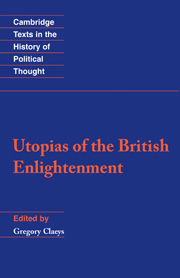Book contents
- Frontmatter
- Contents
- For Anna
- Introduction
- Chronology of main eighteenth-century British utopian and anti-utopian texts
- Bibliographical note
- Biographical notes
- A note on the texts
- [Anon]: The Island of Content: or, A New Paradise Discovered (1709)
- [Anon]: A Description of New Athens in Terra Australis Incognita (1720)
- David Hume: Idea of a Perfect Commonwealth (1752)
- [James Burgh]: An Account of the First Settlement, Laws, Form of Government, and Police, of the Cessares, A People of South America (1764)
- [Thomas Northmore]: Memoirs of Planetes, or a Sketch of the Laws and Manners of Makar (1795)
- William Hodgson: The Commonwealth of Reason (1795)
- [Anon]: Bruce's Voyage to Naples (1802)
- Index
- Cambridge Texts in the History of Political Thought
William Hodgson: The Commonwealth of Reason (1795)
Published online by Cambridge University Press: 05 June 2012
- Frontmatter
- Contents
- For Anna
- Introduction
- Chronology of main eighteenth-century British utopian and anti-utopian texts
- Bibliographical note
- Biographical notes
- A note on the texts
- [Anon]: The Island of Content: or, A New Paradise Discovered (1709)
- [Anon]: A Description of New Athens in Terra Australis Incognita (1720)
- David Hume: Idea of a Perfect Commonwealth (1752)
- [James Burgh]: An Account of the First Settlement, Laws, Form of Government, and Police, of the Cessares, A People of South America (1764)
- [Thomas Northmore]: Memoirs of Planetes, or a Sketch of the Laws and Manners of Makar (1795)
- William Hodgson: The Commonwealth of Reason (1795)
- [Anon]: Bruce's Voyage to Naples (1802)
- Index
- Cambridge Texts in the History of Political Thought
Summary
‘The Privileged Orders may pass away,
but the people will be eternal.’
MirabeauPlan, &c.
Argument.
Experience having proved corruption to be the most dreadful evil that can possibly affect either public or private life, it is of course that which men should be most studious and zealous to avoid; any endeavour, therefore, to raise up barriers against this all-destructive vice, may be considered as one of the noblest efforts of the human understanding; as from thence has proceeded all those arbitrary and diabolical actions we have at different periods witnessed; and of which such innumerable examples, that have justly called down the execration of mankind, are furnished in the history of the world.
As corruption is generally the result of power long continued in the same individual, and prevention more humane and far better than detection, it is my intention, in this Plan, to make every situation in the Commonwealth, to which is attached either trust or power, revolutionary or rotative; thereby taking what I conceive to be the best remedy for, and precaution against, this most inveterate enemy to public happiness; this epidemic, that has hitherto baffled the most strenuous efforts of the most able physicians; this political Upas, under whose baneful and malignant branches every virtue finds immediate death.
- Type
- Chapter
- Information
- Utopias of the British Enlightenment , pp. 199 - 248Publisher: Cambridge University PressPrint publication year: 1994
- 1
- Cited by



